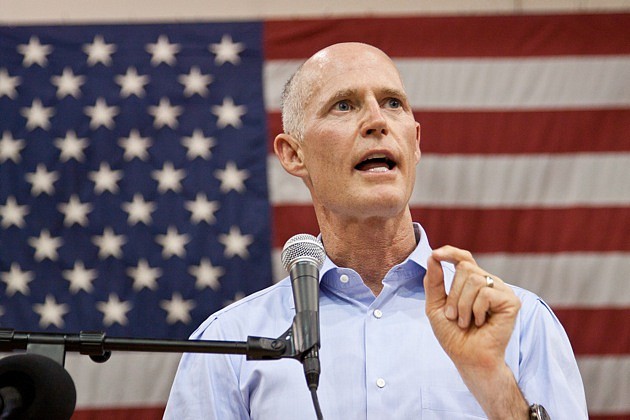- July 26, 2024
-
-
Loading

Loading

Rick Scott's ambitious plan to create 700,000 news jobs in Florida will now be put to the test.
Gulf Coast business executives and leading Democratic politicians agree that he will have to prove to voters they made the right choice, and the economic environment will not be easy. But the politics should be.
Now solidly in the hands of Republican leadership with Gov.-elect Rick Scott, an all-Republican cabinet and a veto-proof House and Senate, everyone will know which party to credit or blame.
“When you have one party at every single level, you certainly know who to hold accountable for the results,” observes Tampa Mayor Pam Iorio, a Democrat. Iorio summed up the Nov. 2 election saying, “ ... voters want things to be different, a different economy and a different way of doing things.”
Scott's business plan to create 700,000 jobs will likely be the Naples resident's biggest challenge, and one voters are surely to judge him on as the four-year term unfolds. The governor-elect will have a Legislature full of fellow pro-business conservatives to smooth the way with 81 Republicans in the 120-member House and 28 in the 40-member Senate.
“The Republican Party could railroad things through without any counterbalance,” predicts Democrat and Alex Sink supporter Craig Sher, executive chairman of Sembler Co., the St. Petersburg-based commercial real estate developer.
“There could be some big changes ahead,” says Sher, whose company, ironically, could benefit nicely from de-regulation or lower taxes on businesses that are part of the Scott agenda and largely shared by the more conservative Legislature coming into power.
Michael Reitmann, executive director for the Lee Building Industry Association, says the election of Scott “is fantastic news for the business community and the real estate and construction industry.”
“He's got a plan to put people back to work,” adds Reitmann about Scott's 7-step plan. “I actually am going to take his word for it. The proof will be as it manifests itself over the next few months.”
It may take a bit longer than that. Scott's plan is designed to play out during the next seven years, so he may have to win re-election to fully implement it.
Republican Robert Abberger, senior managing director for Trammell Crow Co. in Tampa, calls the governor's race “the most difficult race and decision amongst everyone that I spoke to. Alex is a local and trusted friend. Scott brought a compelling message, but for the most part is an unknown.”
Abberger is a big light-rail and high-speed rail proponent, so he'd like to see Scott endorse rail. “We need a governor who has the ability and vision to take Florida to where it needs to be in 20 years from now, not just next year.”
Still, Abberger knows voters will judge Scott more for what happens over the next two years just as President Obama's policies were the lightning rod for the overwhelming Republican victories this election. Abberger says Republicans need to build on the new momentum. “If we don't see that, then in two years we're probably going to see another wave.”
Kerry Kirschner, a Republican, and executive director of Sarasota's Argus Foundation — a group of high-powered business executives — sees the challenges for the Scott administration and the Legislature, too. He compares the new conservative mandate to “the proverbial dog catching the car. Now, they got to show what they're going to do with this mess.”
Now that he has won the governorship, Rick Scott can implement the economic plan he ran on.
Summary of seven-step economic goals over a 7-year period:
700,000 jobs;
$74 billion in state gross domestic product;
$1 billion in higher personal income;
$1 billion in total state tax revenues as a direct result of the increased economic growth.
Regulatory reform — 240,000 jobs
Limit frivolous lawsuits by implementing tort reform.
Impose a regulatory freeze and review existing and proposed regulations.
Review state development regulations and expedite permits for job-creating businesses, such as Enterprise Florida's targeted industries.
Lower workers' compensation costs.
Bring health insurance costs and mandates in line with the U.S. average.
Focus on job growth and retention — 60,000 jobs
Add resources and trained specialists for local economic development offices to help local businesses obtain grants and comply with regulatory processes.
Eliminate overlapping state economic development agencies.
Make economic development programs more flexible.
Invest in the state Innovation Fund to develop high-tech clusters with high-paying jobs.
Nurture new technology clusters such as biotechnology.
World class universities
Invest in university research, labs, business incubators and technology transfer.
Connect university research to the state's economic development process.
State economic development grants will include partnerships with universities to develop research strengths into unique clusters.
Reduce property taxes
Reduce the required local effort of the statewide school property tax by 1 mill (from 5.29 mills to 4.29 mills) for a savings of $1.4 billion, or $142 for the average homeowner.
Phase in another 1 mill reduction over the next seven years.
Eliminate tax on Florida businesses — 365,000 jobs
Phase-out business income tax over time.